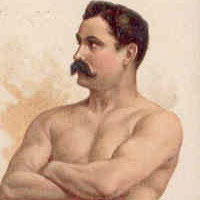ティーボー・バウアー、試合に出場したことを否定 1876
ティボーまたはテオバルド・バウアーはフランスのレスラーでした, グレコローマンレスリングを専門とする人. バウアーがアメリカに到着したのは、 1875 レスリング世界グレコローマンヘビー級選手権への疑わしい主張. 彼は自分のタイトルを守るだろう 5 ウィリアム・マルドゥーンに敗れるまで数年。 1880. プロレスファンがバウアーのことを少しでも知っているとしたら, 通常、対戦相手のマルドゥーンが世界のタイトルを獲得するためにビートするようにです.
1870年代のレスリングファンは、バウアーのキャリアの別の側面を知っていたでしょう. 彼は頻繁に告発されました “働く” マッチ. バウアーと彼の対戦相手は、試合前の結果に同意し、合法的なコンテストの代わりに展示会で互いに協力します. この実践は20世紀のほとんどで一般的な場所でしたが, ギャンブルは19世紀のプロレスの大部分でした. ファンはお金を失っています “働いていました” 試合は大きな懸念事項であり、スポーツにダメージを与える可能性があります.

テオボー・バウアーのアーティストによるレンダリング, パブリック ドメインの 1870 年代と 1880 年代のグレコローマン レスラー
バウアーがセントに到着したとき. マッチのルイ 1876, 彼は地元の賞金のプロモーターであり、元賞を受賞したジャック・ルーニーに暴露されました. ルーニーは地元のバーを所有しており、ミシシッピ川の無人島で裸のナックル賞を手配するのを手伝いました.
米国では、賞を受賞していました. 島での試合のスケジュールは、ミシシッピ州の強い流れが島に上陸するために危険なボート旅行のために、試合への警察の干渉を防ぐのに役立ちました, あなたの管轄区域にあるかもしれないし、そうでないかもしれません.
バウアーとのgrみから, 賞の戦いで頻繁に守られていた人, または、ルーニーは彼の賞の戦いのための競争を望んでいなかったからです, ルーニーは5月にバウアーの練習を暴露しました 1876.
両方の出場者が他のレスラーが授与されるいくつかのお金を上げることはプロレスの一般的な慣行でした, 彼が試合に勝ったら. 例えば, 各出場者は我慢します $300.00 彼はついにジェンキンスに彼に会うように説得したが、試合が起こると彼が思った方法ではなかった. バウアーが勝ったら, 彼はゲートの領収書の割合が高くなり、 $300.00 相手からのサイド賭け.
ルーニーは、バウアーと彼の対戦相手が彼らのサイド賭けを引くのが一般的だと言いました, 結果に同意してから、ゲートレシートを均等に分割します. ルーニーは試合の結果について賭けをしていると彼らに非難しませんでしたが、プロキシベットを通じてこの方法で自分自身を豊かにする方法を見るのは簡単です.
バウアーは5月に地元の論文に挑戦をすることで応答しました 5, 1876 戦いの違いを解決するためにいつでもルーニーに会うために. 10 数年前, ルーニーはバウアーに会う機会に飛びついたかもしれません. Nearing 50 しかし、年齢, ルーニーは、初期のボクシングとレスリングの試合でバウアーと戦わないことを決めました.
バウアーはセントに戻りました. 9月のルイ 1876 間違いなく頻繁に対戦相手のウィリアム・ミラーとの作業試合だったのは. 4か月前の露出は、STとしてこの試合にあまり影響を与えなかったようです. ルイポストディスパッチはそれを呼びました “バウアーのボナンザ”. 19世紀でさえ, レスリングファンは、信念を一時停止する意思がありました, 試合が面白いかエキサイティングな場合.
以下のコメントセクションまたは私の投稿で、コメントを残したり、これや投稿について質問したりできます。 Facebookページ.
Sources: ST. ルイ·ポストディスパッチ, 5月 5, 1876 edition, P. 4 , <スパンbbox_x = "925" bbox_y = "2116" bbox_w = "63" bbox_h = "19" FSIZE = "13" fweight = "3"赤= "255"緑= "255"青= "255"アルファ= " 27, 1876 edition, P. 4 and October 2, 1876 edition, P. 4
Pin It
